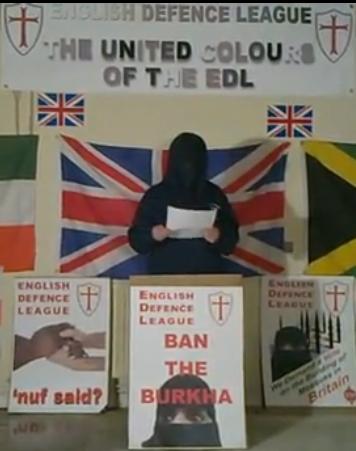Banning Pamela Geller was just not British

English Defence League demonstration in Birmingham, 2009. Israel represents for them the violent military degradation of Muslims and Africans. Photo by PA.
Don’t Ban Pamela Geller — It’s Not [the]Jewish Way
By Liam Hoare, Jewish Forward blog
July 29, 2013
The tradition of English liberty which runs through the political culture is a deep one, traceable back to John Milton’s Areopagitica, published in 1644, through Thomas Paine’s The Age of Reason and John Stuart Mill’s On Liberty. The nub of it was best put by Mill when he wrote, “If all mankind minus one, were of one opinion, and only one person were of the contrary opinion, mankind would be no more justified in silencing that one person, than he, if he had the power, would be justified in silencing mankind.”
It is with this in mind that the recent decision by the British government to pre-emptively exclude Pamela Geller from travelling the United Kingdom should be considered. Geller, it must recalled as often as possible, is a speful and malicious person. Founder of Stop Islamisation of America and proprietor of the Atlas Shrugs blog, she has used her public platform to minimise the Bosnian genocide, label secular, democratic Kosovo a “militant Islamic state in the heart of Europe,” and perpetuate the myth that President Obama is the secret love child of Malcolm X.
And then there’s Islam, about which she has said so much it’s hard to filter. “There are no moderates. There are no extremists. Only Muslims,” she said. “Devout Muslims should be prohibited from military service. Would Patton have recruited Nazis into his army?” she enquired on another occasion.
Geller has expressed support for Geert Wilders and the thuggish English Defence League, with whom she shares concerns about the so-called Islamisation of Europe, even nefariously calling upon Jews to stand up with them in this struggle.
But even considering the foregoing, or especially considering it, withdrawing Geller’s right to speak and address a rally organised by the EDL in the London neighborhood of Woolwich violated English liberal tradition. It is precisely this sort of application of state power to silence another that Mill deemed ‘noxious’ in any circumstance, whether “exerted in accordance with public opinion, than when in or opposition to it.” The state, rather, must protect against “the tyranny of the prevailing opinion and feeling; against the tendency of society to impose, by other means than civil penalties, its own ideas and practices as rules of conduct on those who dissent from them.”
Geller’s case would be especially troubling because the government not only proscribed her based on what she had said but what she might say. If she were to repeat her slurs against Muslims of the type previously exhibited, she would be “committing unacceptable behaviours”, the Home Secretary deemed. This type of prior restraint goes against the grain of English liberty. Mill questioned rightly what authority has the right to decide what words are appropriate or inappropriate, what behaviour is acceptable or unacceptable. “They have no authority to decide the question for all mankind, and exclude every other person from the means of judging.”
Indeed, by excluding Geller not only did the government take away the right of the people to hear, they also removed their right to listen and to judge, to be challenged or (far more likely) to re-establish first principles. “If the opinion is right, they are deprived of the opportunity of exchanging error for truth,” Mill argues. “If wrong, they lose, what is almost as great a benefit, the clearer perception and livelier impression of truth, produced by its collision with error.”
And the power of the truth to clarify and cut through ought not to be underestimated. In circumstances where “all the winds of doctrine [are] let loose to play upon the earth,” we do truth an injustice, Milton believed, by so “misdoubting its strength” as to censor other opinions. “Let her and Falsehood grapple,” he wrote, for “who ever knew Truth put to the worse, in a free and open encounter?”
In recent years, the most infamous example of truth’s victory was the appearance of the British National Party chairman Nick Griffin on Question Time, a BBC debate programme where the general public gets to pepper a panel of politicians, activists, and journalists. The BBC lending its imprimatur to Griffin was the subject of much chatter and uproar regarding the limits of free speech, with The Guardian arguing “a ratings-hungry corporation failed to defend the values embodied in its own equality policies” and that Griffin’s words might “provoke racists’ deeds.”
Below: The English Defence League at Woolwich, site of the murder of Lee Rigby to which they had invited Pamela Geller. Though she might not have recognised them as they adopted the habit of ultra-orthodox Muslim women of covering their faces. Photo by AFP/Getty Images


Above: EDL speaks against sharia law and covering one’s body in a burka
As it happened, in one hour Griffin was cut down. He was forced to say “I am not a Nazi” and was left unable to explain to a Jewish questioner among others why he had repeatedly denied the Holocaust. The audience labelled him “disgusting” and “an absolute disgrace” and even laughed when he said the Ku Klux Klan was “almost totally non-violent.” This was in 2009 – the BNP failed to win a seat in the general election the following year, and has been in perpetual decline ever since.
It is perfectly reasonable to think, therefore, that if Geller had been admitted to Britain and allowed to speak, the event would have passed without scandal and the truth might even have won out as her views were more widely disseminated. Her contention that the Bosnian genocide is exaggerated and the Serb-run concentration camps weren’t as bad as all that is insidious, but it is also stupid, false, and rebuttable. Similarly, her statements about Muslims and Islam do have the potential to incite, but there are so brazen that anyone ought to be able to see through her chauvinistic rhetoric.
Thus in denying Pamela Geller her right to speak – by failing to protect, as Rosa Luxemburg once termed it, the freedom of those who think differently – the British government did the nation a greater disservice than they could have imagined. They rejected Milton and Paine and Mill in the name of some amorphous public good. They fed into Geller’s own sad, self-pitying narrative that she’s some sort of victim and a radical, saying the things that must be said or cannot be said. But above all, they took away from Geller a tremendous opportunity to make herself look foolish.
Notes and links
Just a few of the very many opportunities Pamela Geller has been given, or taken, to speak freely.
John Stuart Mill’s essay on freedom of speech can be read here: Chapter II: Of the Liberty of Thought and Discussion. It centres on why governments should not suppress newspapers and the right of a person in a minority of one to express his/her opinion.
Liam Hoare is a British, non-Jewish, Liberal Zionist who ‘loves the Jewish state’.


